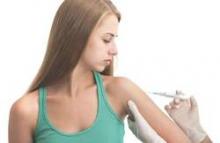Vaccination with Gardasil, the quadrivalent human papillomavirus (HPV) vaccine, can reduce cervical dysplasia and genital warts as early as 14-17 years old, a recent study found.
“The fact that these benefits were observed in such a young age group strengthens current recommendations that vaccination should occur at an early age,” reported Leah M. Smith of McGill University, Montreal, and her associates. “As such, policy makers and physicians can use these findings to substantiate arguments that delaying vaccination may result in missed opportunities for prevention,” they wrote (Pediatrics 2015 April 27 [doi:10.1542/peds.2014-2961]).
In a population-based retrospective study in Ontario, Canada, the researchers compared the incidence of cervical dysplasia and anogenital warts between 131,781 girls in grade 8 during the 2005-2006 and 2006-2007 school years – before the HPV vaccination program was implemented – and 128,712 girls in grade 8 who were eligible for HPV vaccination in the 2007-2008 and 2008-2009 school years. Among those eligible for the vaccine, 75,848 received at least one dose, and 88% of these girls received all three doses.
Of the 2,436 cases of cervical dysplasia that occurred, 5.7 fewer girls per 1,000 developed cervical dysplasia if they had been vaccinated, compared with those not eligible for vaccination. The reduced risk for cervical dysplasia of 44% among vaccinated girls translated to 1 case prevented per 175 girls vaccinated. Simply being eligible for the vaccine also appeared to decrease risk of cervical dysplasia by 21%, or 2.32 fewer girls per 1,000.
Overall, 400 cases of genital warts occurred. Vaccinated girls had 43% lower risk for genital warts (0.83 fewer per 1,000), and eligibility for the vaccine reduced the risk by 19% (0.34 fewer girls per 1,000), but neither of these results reached statistical significance.
The research was funded by the Canadian Institutes of Health Research and the Ontario Ministry of Health and Long-Term Care. The authors reported no disclosures.


